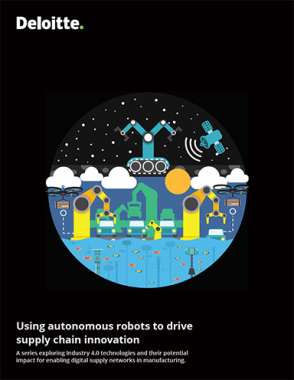Deloitte’s Q2 2016 Global Economic Outlook

In the second-quarter edition of the Global Economic Outlook, Dr. Ira Kalish and Deloitte’s team of economists explain the factors driving the uncertainty in the global economy.
The year 2016 started with a bang rather than a whimper.
Financial market volatility soared in the first two months of the year, driven by uncertainty around several key factors influencing the global economy.
These included worries about the depth of China’s slowdown and the Chinese policy response, the rapid fall in oil prices and the impact on energy company finances, the sustainability of the US recovery, and the potential for a reversion to deflation in Europe.
In the realm of policy, central banks once again took center stage, with news of more quantitative easing as well as the implementation of negative policy rates - both of which were unheard of less than a decade ago. As the first quarter comes to an end, the volatility appears to have abated, and asset prices have recovered somewhat. Yet uncertainty never seems to go away.
In this edition of Deloitte’s Global Economic Outlook, we try to reduce that uncertainty - or at least explain the factors driving it.
China: On the horns of a trilemma
We begin with my article on the Chinese economy. I note the degree to which China’s exports have suffered lately, contributing to the slowdown in economic growth. I also examine the so-called “trilemma,” which involves the Chinese authorities’ challenges in simultaneously achieving three critical goals: an independent monetary policy, a controlled exchange rate, and an easing of capital controls.
The upshot is that something will likely have to give. Likely, either China will experience a sharper depreciation in its currency, or it will institute more severe capital controls.
United States: Moderate growth to continue, but when will wages begin rising?
Next, Patricia Buckley examines the US economy. Patricia discusses the Federal Reserve’s decision making and its likely impact.
She notes that although the US economy faces headwinds from a strong dollar and weak oil prices, underlying economic performance remains sufficiently strong to warrant a normalization of interest rates. She says, “The US economy, while not booming, has returned to a state of health that warrants a more normal monetary policy stance.”
Eurozone: Recovery intact, institutional turmoil ahead
In his article on the Eurozone economy, Alexander Börsch says that growth continues at an unspectacular pace, driven by consumers who have benefitted from lower oil prices. Yet the decision by the European Central Bank to further ease monetary policy suggests that the “economic situation is far from normal.”
Alexander also discusses at length the potential impact of a British exit from the European Union on the rest of Europe. He suggests two possibilities: first, that “Brexit” contributes to an unravelling of the European Union; and second, that Brexit actually leads to an intensification of integration within the rest of the European Union.
Japan: Finding the right policy mix
In my article on Japan, I discuss the disappointing state of the Japanese economy, including the surprising weakness of the export sector. I also examine the debate over fiscal policy, including whether the government ought to recant on its promise to raise the national sales tax next year.
Finally, I look at the Bank of Japan’s decision to implement negative policy rates and what this might mean for the economy.
India: It’s going to be all about consumption
Rumki Majumdar provides her view on the Indian economy next. She notes that, in a world of uncertainty and slow growth, India offers the appearance of an oasis. Moreover, she offers an optimistic take on the outlook. She says that a combination of declining oil prices and an easing of credit conditions bode well for continued strong growth of consumer spending - which has been a key factor in sustaining relatively strong growth.
Rumki also suggests that the government’s budgetary plans bode well for growth too. On the other hand, she points to risks to the Indian economy, including a strengthening currency that has hurt exports, weak global interest in investing in India, and the problem of nonperforming loans in the Indian banking system.
Russia: In austere times
Next, Russia is the focus of Lester Gunnion’s article. Lester not only points to the deep and continuing recession; he also draws attention to the increasing fiscal difficulties that the Russian government will face if oil prices don’t significantly recover. He points out that Russia risks depleting much of its financial reserves within two years, thus necessitating even more draconian cuts in government spending.
This, in turn, would mean that the government would be in less of a position to ease the burden of declining economic activity on ordinary citizens. Moreover, the government’s plan to restore reserves by printing rubles risks fueling inflation and stimulating a further currency depreciation.
Brazil: Yearning for the good times
Brazil is another troubled economy, and is the subject of Akrur Barua’s article this quarter. Akrur discusses in some detail the severity of Brazil’s economic decline. But he also notes that, amid the turmoil, exports have performed well. Despite having lost much of its commodity export market due to declining global demand, Brazil’s weakened currency (down more than 40 percent in the past two years) now sets the stage for a revival of manufactured exports. Yet currency depreciation alone will not be sufficient to significantly improve Brazil’s competitiveness in the global economy. Akrur also discusses obstacles to growth of domestic demand, including high interest rates.
Finally, he discusses the issue of “fiscal dominance,” in which the central bank’s hands are tied by an uncomfortably high government interest obligation. The outlook remains worrisome, especially given political paralysis and crises.
Canada: Keynes arrives
Danny Bachman offers some thoughts on the Canadian economy in our next article. He discusses the fiscal stimulus plans of the new government, which are unique within the developed world. While the stimulus is likely to have a positive effect on GDP growth, much of the stimulus will leak out of the country in the form of increased imports.
Danny also examines the worrying level of consumer debt in Canada, and discusses the debate over whether Canada’s housing market is characterized by a bubble.
United Kingdom: Brexit or not to Brexit?
Our last country article, written by Ian Stewart, concerns the United Kingdom. Appropriately, and certainly not surprisingly, Ian focuses on the upcoming referendum on Brexit. While Alexander’s article looks at the impact of Brexit on the larger European Union, Ian focuses on the British impact and several potential scenarios should voters say no to the European Union.
While he sees potential short-term disruption from an exit vote, he says that the longer-term impact is hard to estimate, especially as it will depend on the kind of relationship the United Kingdom maintains with the European Union going forward.
Impact of negative interest rates: Living in the unknown
Finally, in our last article this quarter, Akrur Barua and Rumki Majumdar look at the growing use of negative policy interest rates by several central banks. Although I cover the Japanese experience in my article on Japan, they look at the issue from a broader perspective, with a particular focus on Europe. In essence, Akrur and Rumki offer a primer on the subject, explaining the why, how, desired impact, and risks.
They conclude that there are limits to this policy, and that monetary policy alone cannot “tackle challenges” unless there are also “structural reforms and coordinated fiscal policy.”
Cover Image: Stephanie Dalton Cowan
Source: Deloitte University Press
Related: The Deterioration of Global Supply Chain Conditions

Article Topics
Deloitte News & Resources
MHI Report: Investment increases as supply chains become more tech-forward and human-centric Global Trade Tensions, Material Shortages Not Expected to Ease in 2024 Blockchain in Supply Chain Continues to Mature Supply Chains Struggle to Access Reliable Emissions Data from Suppliers State of the industry: MHI releases annual report at ProMat 2023 MHI and Deloitte launch 2023 Annual Industry Report survey How Amazon Is Preparing For Fully-Electric Drone Delivery More DeloitteLatest in Supply Chain
Meet Bluicity: The Startup That’s Predicting and Perfecting the Supply Chain Impending Canadian Rail Strike Could Paralyze Country’s Economy Auto Parts Makers Receive $100 Million to Help Ease Switch to Electric April Employment Update: Trucking Sector Faces 300 Job Losses Porsche Gets Greener, Shifts to Sustainable Transport Logistics How Much Will it Cost to Repair Baltimore’s Francis Scott Key Bridge? Retailers Take Lead in Big-Box Warehouse Leasing, CBRE Finds More Supply Chain














